Table of contents
You know a lot about farming, from planting crops to taking care of animals.
But when it’s time to tell potential employers about what you can do, it might feel hard to explain it all in one page.
A well-organized farming resume is like a map of your farming experience, showing the highlights of what you’ve done. Understanding what to feature on your resume is the first step, and soon, you’ll learn how to make an impressive one.
This guide will give you:
- Examples of great farming resumes.
- Tips to make your farming resume stand out.
- Advice for farmers at all stages of their careers.
- Why cover letters are important for your job application.
- Key tips to improve your resume.
Need help with your farming resume? Our Resume Builder is here to help! Pick a design that fits a farming career and get personalized advice for each section, along with customizable text suggestions. It’s simple and easy to use!
Popular farming resumes
Before you even start writing, you should know what a great farming resume looks like.
The key is to show your farming skills and experiences in a clear and concise resume that’s easy for anyone to understand. Here are three resumes for different farming careers, each one a compelling example of a good resume:
How to write a resume for a farming job
Ready to take your farming skills to the next level? Start by making a resume that’ll catch the eyes of farm managers.
Here’s what your resume outline should include:
- Put your contact information at the top so they can reach you easily.
- Write a short resume profile about what makes you a great farmer.
- List the skills you have that are important for farming.
- Outline your jobs, starting with the most recent one.
- Include your schools and any degrees or certificates you’ve earned, even the unfinished ones.
- Add anything that might make you stand out, like awards or training.
Okay, ready to go through each part step by step? Let’s go!
Step 1
Start with your contact information
Think of your resume as a business card you’d give out at a farm show. If you want the person hiring you to get in touch, make sure it’s really easy for them to find your contact details. Put your contact info at the top so they can’t miss it.
Make sure your resume header includes these:
- Your full name.
- Your phone number.
- A professional email address.
- The city and state you live in.
Here’s a tip: keep your resume header simple and tidy.
Now, let’s move on to writing your summary.
Step 2
Write a great summary for your farming resume
This is your opportunity to make a great impression.
At the beginning of your document, give a quick look into who you are — showing your top skills and experiences. This introduction is the best place to explain why you’re the perfect person for the job and to catch the recruiter’s eye.
Depending on how much farming experience you have, you have a couple of options for your resume profile:
Experienced farmers should write a professional summary. This is where you can put together four or five sentences that show off your best skills and experiences.
New to farming or trying out a new sector of farming? A resume objective is a good choice. Here, you’ll talk about your career goals and how you plan to help the team, showing you’re committed.
Your goal is to show you’re a great fit for the job, like a farmer and their tractor.
How do you do this? Start by asking, “What is this company’s culture?” or “What are they looking for in a candidate?” Look into their mission statement so you can customize your resume, highlighting the achievements and skills they will appreciate.
Personalize your summary or objective for each farming job you apply for. Keep in mind that every farming job is unique. By tweaking your resume for each role, you can emphasize the skills and experiences they’re seeking in the job description. This approach also helps ensure your resume gets through applicant tracking systems (ATS) and catches the employer’s eye.
Professional summary example for a farming resume:
Dedicated and experienced farmer with over 10 years of hands-on experience in crop production, livestock management and sustainable farming practices. Proven track record of improving crop yields through innovative techniques and efficient resource management. Skilled in operating and maintaining a variety of farm machinery and equipment. Strong understanding of agricultural regulations and safety standards. Committed to promoting environmental stewardship and sustainable farming methods.
Resume objective for an entry-level farming resume:
Enthusiastic and hardworking individual seeking an entry-level farming position to utilize passion for agriculture and hands-on skills. Eager to learn and contribute to crop production and livestock care. Committed to promoting sustainable farming practices and maintaining high standards of farm operations. Looking forward to working with a dedicated team to grow knowledge and positively impact the farm.
Step 3
Outline your best skills
From operating farming equipment to working well with your team, you use many different skills on the farm every day. The trick is to show these skills on your resume in a way that stands out.
Technical tasks use your hard skills, like planting crops or caring for animals. Your soft skills come through when you’re working with others or explaining how to improve farm processes.
It’s not about choosing between hard and soft skills; it’s how they work together that makes you a great candidate.
While listing your technical skills — like operating machinery — is important, don’t forget to highlight your problem-solving abilities. These skills show you can effectively tackle issues that arise on the farm, making you a valuable and reliable team member.
Skills to feature on your farming resume:
- Crop management
- Equipment operation and maintenance
- Animal husbandry
- Soil and water management
- Communication
- Leadership skills
- Adaptability
- Teamwork
Step 4
List your work history
Your career in farming involves growing crops, caring for animals and keeping the farm running smoothly. Whether you’re planting seeds, using tractors or feeding livestock, your work is essential.
When writing your resume, make sure your experience stands out. Here’s how:
- Focus on achievements, not just tasks. Instead of just listing what you did, talk about what you accomplished. For example, mention how you increased crop yields or improved animal health.
- Show your progress. List your jobs from the most recent to the oldest. This helps show how you’ve advanced and gained more skills over time.
- Use strong action words. Make your resume lively by using words like “improved,” “managed” and “organized.” This makes your experiences sound more impressive and impactful.
If you’re starting out, don’t underestimate your unpaid farming experience. Show your experience working on the farm, whether planting crops, taking care of animals or using farm equipment, regardless of whether you were an official employee or not.
Farming work experience entry example:
Farm Assistant
Sunny Fields Farm | Springfield, IL | August 2021 – May 2024
- Assisted with planting, cultivating and harvesting crops, increasing crop yield by 15% through efficient practices.
- Fed and cared for 50+ livestock, monitored their health and assisted with breeding and birthing, resulting in a 10% increase in healthy births.
- Worked closely with a team of 10 farmworkers to complete tasks efficiently, enhancing team productivity by 18%.
Step 5
Detail your education
Remember all those early mornings helping out on the farm and learning about crops and animals? They’re about to count for something. Your education section is a big sign to your future employer that you know your way around farming and agriculture.
Here’s how to list your education:
- If you went to agricultural school or took farming courses, list those first.
- Next, talk about your high school diploma if you didn’t complete higher education.
- Mention any special farming programs or workshops you attended.
If you have just one certificate, you can add it to your education section. If you have more than one certification or additional training, it may be best to put them in their own section.
Farming education example:
Education:
Advanced Farming Techniques Program
Green Valley Agricultural Institute, 2023
High School Diploma
Springfield High School, 2022
Certifications:
- Certified Crop Advisor (CCA), 2023
Step 6
Add optional sections
Are you starting your journey in farming, or have you done some things outside of a regular farming job? Your resume can show so much more than your work and school experience.
To make your farming resume stand out, think about adding a few extra sections. These can really show who you are and the qualifications you bring to the table.
Here are some ideas:
- Volunteer experience: Include any volunteer work or participation in community farming projects, local farmers’ markets or agricultural fairs. This shows your engagement and dedication to the farming community.
- Training: List any relevant training programs you’ve completed, such as pesticide application, soil management courses or animal husbandry workshops. This demonstrates your commitment to learning and staying updated in the field.
- Honors and awards: Highlight any awards or recognitions you’ve received, such as “Farmer of the Year,” “Highest Crop Yield” or “Innovation in Farming Techniques.” This section showcases your accomplishments and sets you apart as an exceptional candidate.
Finally, picking the right resume template is important. You’ll find many options, from simple to more creative styles. Choose one that fits your personality and the farming job you’re applying for.
Microsoft Word and Google Docs also offer plenty of free options. The key is to keep your resume clean and easy to read, showing your farming experience in the best way possible.
Creating a resume doesn’t need to be difficult. Follow the tips we’ve discussed and review the following examples to help you land that interview!
resumes made with Resume Now!
Farming resume examples by experience level
Work experience is the heart of a farming resume. The more you work on the farm, in the field or even in an office, the more you grow and open up new opportunities for yourself.
As you gain more experience, you might need to change how you organize your resume. There are three main types of resume formats, and each one is great for a different stage in your farming journey:
- If you’re an entry-level farmer, a functional resume layout is a good choice. It focuses on your skills and knowledge rather than where you’ve worked.
- If you’re in the middle of your career, a combination resume layout works well. It balances your skills with your work history.
- If you’re an experienced farmer, a chronological resume layout is best. It highlights your job history, beginning with your most recent position and illustrating your career progression.
Let’s explore what each of these formats looks like.
Entry-level farming example
Why this is a great resume:
- Clear objective
Joshua’s resume starts with a clear, focused objective that highlights his motivation and dedication to the role. This shows his genuine interest in contributing positively to farm operations and addressing the employer’s needs.
- Structured layout
The resume is well-organized with clear headings, making it easy for employers to find the relevant information quickly. This structured layout ensures that key details are easily accessible, enhancing readability.
- Focus on relevant skills and achievements
This resume focuses on Joshua’s skills and knowledge from previous roles and internships, showcasing his capability through specific examples and quantifiable achievements. This approach demonstrates his preparedness for the position, even with limited job experience.
Midcareer farming resume example
Why this resume is an excellent example:
- Solid professional summary
Janet’s resume begins with a concise professional summary highlighting her six years of experience. This section effectively outlines her plant care and sustainable gardening expertise, setting the stage for her accomplishments.
- Relevant experience
A chronological overview of Janet’s professional journey, highlighting her increasing responsibilities and achievements, shows her expertise. Each role includes needed accomplishments, such as increasing plant health and vitality.
- Strong educational background
Janet’s education and certifications show her formal training and professional skills. Credentials like being a Certified Professional Horticulturist (CPH) and attaining a Sustainable Landscape Management Certification prove her expertise and dedication to her field.
Experienced farming resume example
Why this resume stands out:
- Uses a clear and professional structure
Ryan’s resume uses a clear and professional structure that makes it easy for hiring managers to find key information quickly. This format highlights his job titles and dates in a traditional layout, ensuring an easy understanding of his career progression and accomplishments.
- Work history is front and center
Ryan’s work history is rich with accomplishments and demonstrates a steady progression in his career. Each role he’s held is detailed with achievements, such as increasing crop yield by 20% and reducing resource usage by 15%.
- Highlights a steady career growth
By highlighting his progression from junior to senior agricultural engineer, Ryan demonstrates his reliability and consistent success in the field. Employers value this clear track record of growth and achievement, making him a strong candidate for any agricultural engineering role.
Write a compelling farming cover letter
Believe it or not, a standout cover letter might be the key to getting a farming job.
A cover letter is your chance to talk about things that didn’t fit in your resume. This could be a break you took to learn more about farming or maybe you’re switching to farming from another job. Start with our cover letter-writing guide to hit all the important points.
When you’re ready to write, check out our cover letter examples and our guide to formatting your letter so it gets noticed for all the right reasons.
If you’re short on time or just want to make sure your cover letter is perfect, try a cover letter generator. These tools give you phrasing suggestions that are great for farming jobs, and you can tweak them to make sure they sound just like you and showcase your personal achievements.
Wondering what’s next in your farming career? Let’s explore the opportunities that might be ahead for you.
Facts about the farming career field
Curious about what the farming world is like and where your career could go?
Here are some interesting facts about the farming industry that show why having a great resume is so important:
- According to the Bureau of Labor Statistics, the median pay for agricultural workers is $34,790, or $16.73 per hour.
- There are 804,600 agricultural workers working in the U.S.
- Farmers, ranchers and agricultural managers make a median wage of $88,770 a year, or $40.27 an hour.
- Every year, there are an estimated 88,800 job openings projected for farmers, ranchers and agricultural managers.
Farming resume — key takeaways
Customize your farming resume
Every farming job is different, so make sure you carefully read the job posting. Adjust your resume to highlight the skills and experiences they’re specifically looking for.
Show off your farming skills
Whether it’s operating machinery, crop management or animal care, make sure your resume showcases the unique abilities you bring to the farm.
List your certifications
Certifications can really make you stand out in the farming industry. If you have any, be sure to list them prominently on your resume.
Prove your achievements
Results matter in farming. Use specific numbers to show what you’ve accomplished and your impact on previous farms.
Detail your hands-on experience
Any practical experience on a farm is valuable. Describe the tasks you’ve worked on, the methods you’ve used and the results you’ve helped achieve.
Proofread carefully
Accuracy is key in farming, too. A small mistake on your resume could be a big deal. Double-check your resume yourself and then ask someone else to review it too.
Include a cover letter
Don’t underestimate the power of a cover letter. A well-written one can show your enthusiasm and dedication to farming in a way your resume alone might not.
Commonly asked question about resume writing
Was this information about Farming Resume: Examples, Templates & Tips helpful? Let us know!
Karla is a career advice writer dedicated to helping job seekers excel in their careers.
More resources

What if I Don't Have Professional References?
Access advice on what to do if you get to the reference check ...

The Most Dangerous Jobs in America: Some Pay Less Than $40K, Others Top $190K
Resume Now s report reveals the highest and lowest paying dang...

How to Write a Resume: Guide & Examples for 2025
If you re wondering how to write a resume that grabs attenti...

Marketing Resume: Examples, Templates & Tips
Need a marketing resume that represents your personal brand? O...

Nursing Resume: Examples & Templates for 2025
Planning to pursue a nursing career? Let our samples template...

Physical Therapy Resume: Examples, Templates and Tips
Our physical therapy resume examples will help you kick-start ...
